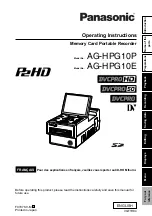
Page 28
-- If P greater than the length of original data, the O-String will be
skipped.
-- If N greater than the number of remaining characters counting from P,
the remaining characters are included as valid.
7.6. Examples
7.6.1. Example 1
If the original data is Code 39 and content is "AA", output "ABC
Company", and otherwise output the original data as it is.
IN_ID
,0,
LEN
,2,2,
MATCH
,1,
"
AA
"
,
"
ABC company
"
,
Enter
IN_ID
,19,
O-STR
,1,
#
,
Enter
7.6.2. Example 2
If the original data is Code 128 and logically divided into:
-- First six characters are personal ID,
-- Other characters are person's name.
The output will be:
-- Personal ID first,
-- A 'CR' character,
-- Two interblock delay,
-- Name,
-- A 'CR' character.
The Formula will be:
IN_ID
,8,
O-STR
,1,6,
"<
CR>
**"
,
O-STR
,7,
#
,
"<
CR>
"
,
Enter
<CR> is a Carriage Return character scanned from Full ASCII Chart.
7.7. Advanced Features
The O-String has the format:
O-STR
,P,N,
Both parameters of
O-String
mentioned above are numbers. But both
parameters can be specified as strings. If N is a string, it becomes a
position and the meaning of
O-String
will be "Output from position P
to position N".
If P is defined as:
"
ab...ik
"
a, b, , i and k can be any character, the position will be evaluated as
-- Start from the first position of the original string and search character
'a'.
-- From the position next to 'a' in original data, search for 'b'.
















































